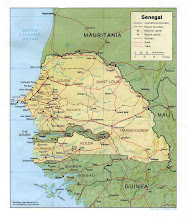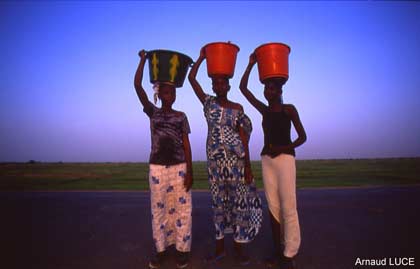World Bank economists predict Senegal’s economic growth may be cut by as many as 1.5 percentage points this year and next because of rising crude prices as Senegal remains reliant on oil-fired power stations. The World Bank earlier forecast that Senegal’s gross domestic product would expand 4.2 percent this year and 4.4 percent in 2012.
Oil-powered plants supply 78 percent of Senegal’s generating capacity of 635 megawatts, according to World Bank statistics.
Saturday, January 22, 2011
Iran emissary sent to meet on weapons discord
It's hard to be friends when your friend is selling guns to those who would hurt you. And sore feelings apparently persist between Iran and Senegal over the arms shipment on its way to Gambia, where it might logically be feared they might wind up in the hands of anti-Dakar Casamance insurgents.
Senegal and Iran enjoyed strong diplomatic ties until the 13 containers loaded with arms and munitions were found in October aboard a ship in Nigeria.
Iran's foreign minister arrived in Senegal this last week to try to smooth things over with Senegal, once close diplomatically. Acting Foreign Minister Ali Akbar Salehi was to meet Senegal President Abdoulaye Wade during the two-day trip. Salehi took over as Iran's caretaker foreign minister after President Mahmoud Ahmadinejad fired his predecessor Manouchehr Mottaki on December 13 as he was on an official visit to Senegal, after the weapons were found.
Senegal recalled its ambassador to Tehran mid-December after Iran failed to provide a "satisfactory" explanation for the weapons.
Among the Senegal-Iran co-ventures we have been following are the Theis "SenIran" Khodros auto manufacturing facility. Other economic cooperation has started or been discussed between the two countries. We will wait to see if any fallout results from the arms controversy.
Senegal and Iran enjoyed strong diplomatic ties until the 13 containers loaded with arms and munitions were found in October aboard a ship in Nigeria.
Iran's foreign minister arrived in Senegal this last week to try to smooth things over with Senegal, once close diplomatically. Acting Foreign Minister Ali Akbar Salehi was to meet Senegal President Abdoulaye Wade during the two-day trip. Salehi took over as Iran's caretaker foreign minister after President Mahmoud Ahmadinejad fired his predecessor Manouchehr Mottaki on December 13 as he was on an official visit to Senegal, after the weapons were found.
Senegal recalled its ambassador to Tehran mid-December after Iran failed to provide a "satisfactory" explanation for the weapons.
Among the Senegal-Iran co-ventures we have been following are the Theis "SenIran" Khodros auto manufacturing facility. Other economic cooperation has started or been discussed between the two countries. We will wait to see if any fallout results from the arms controversy.
Subscribe to:
Posts (Atom)


